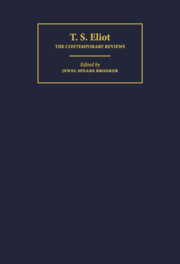Book contents
- Frontmatter
- Contents
- Series Editor's Preface
- Introduction
- Acknowledgments
- Prufrock and Other Observations (1917)
- Poems (1919); Ara Vos Prec (1920); Poems (1920)
- The Sacred Wood: Essays on Poetry and Criticism (1920, 1921)
- The Waste Land (1922)
- Homage to John Dryden (1924)
- Poems 1909–1925 (1925)
- For Lancelot Andrewes: Essays on Style and Order (1928, 1929)
- Dante (1929); Animula (1929); Marina (1930)
- Ash-Wednesday (1930)
- Selected Essays 1917–1932 (1932)
- Sweeney Agonistes (1932)
- The Use of Poetry and the Use of Criticism (1933)
- After Strange Gods: A Primer of Modern Heresy (1934)
- The Rock (1934)
- Murder in the Cathedral (1935)
- Collected Poems 1909–1935 (1936)
- The Family Reunion (1939)
- The Idea of a Christian Society (1939)
- East Coker (1940); Burnt Norton (1941); The Dry Salvages (1941); Little Gidding (1942); Four Quartets (1943)
- Notes Towards the Definition of Culture (1948, 1949)
- The Cocktail Party (1949, 1950)
- The Confidential Clerk (1954)
- The Elder Statesman (1959)
- Index
Collected Poems 1909–1935 (1936)
Published online by Cambridge University Press: 10 March 2010
- Frontmatter
- Contents
- Series Editor's Preface
- Introduction
- Acknowledgments
- Prufrock and Other Observations (1917)
- Poems (1919); Ara Vos Prec (1920); Poems (1920)
- The Sacred Wood: Essays on Poetry and Criticism (1920, 1921)
- The Waste Land (1922)
- Homage to John Dryden (1924)
- Poems 1909–1925 (1925)
- For Lancelot Andrewes: Essays on Style and Order (1928, 1929)
- Dante (1929); Animula (1929); Marina (1930)
- Ash-Wednesday (1930)
- Selected Essays 1917–1932 (1932)
- Sweeney Agonistes (1932)
- The Use of Poetry and the Use of Criticism (1933)
- After Strange Gods: A Primer of Modern Heresy (1934)
- The Rock (1934)
- Murder in the Cathedral (1935)
- Collected Poems 1909–1935 (1936)
- The Family Reunion (1939)
- The Idea of a Christian Society (1939)
- East Coker (1940); Burnt Norton (1941); The Dry Salvages (1941); Little Gidding (1942); Four Quartets (1943)
- Notes Towards the Definition of Culture (1948, 1949)
- The Cocktail Party (1949, 1950)
- The Confidential Clerk (1954)
- The Elder Statesman (1959)
- Index
Summary
*Edwin Muir.
"Mr. Eliot’s Poetry."
Spectator 156, no. 5623
(3 April 1936), 603–04.
The first eighty pages in this volume are taken up by the poems which have already appeared in Poems 1909–1925; the remaining hundred pages contain Mr. Eliot's poetic production for the last ten years, except for Murder in the Cathedral, which is not included. The second part begins with “Ash-Wednesday,” embraces two unfinished poems, Sweeney Agonistes and Coriolan, ten choruses from The Rock, four Ariel poems, thirteen minor poems, and ends with “Burnt Norton,” which is in some ways different from any of Mr. Eliot's other poems, and is one of the most remarkable, I think, that he has yet written.
It will be seen from this that Mr. Eliot has been considerably more productive during the last ten years than during the sixteen years before; but it is very difficult to judge whether he has been productive on the same level, firstly because a writer of such individuality as his changes the taste of his readers, and they come to his later work with a different mind, and secondly because his style has altered. The alteration has been towards a greater explicitness of statement; “Ash-Wednesday” is far more explicit than any poetry that Mr. Eliot wrote before it, and it represents, I think, a turning point in his development. The Waste Land is no doubt his greatest work, but there is in it, compared with his later work, a certain blindness both in the despair it expresses and in turning away from despair at the end.
- Type
- Chapter
- Information
- T. S. EliotThe Contemporary Reviews, pp. 351 - 376Publisher: Cambridge University PressPrint publication year: 2004



